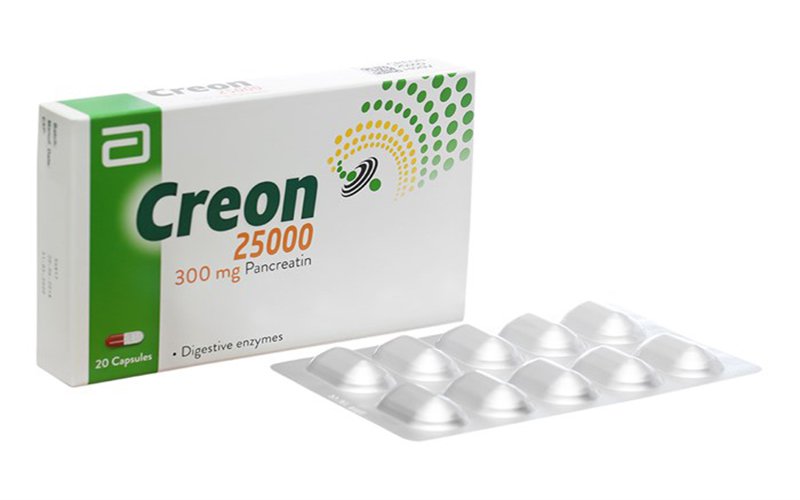Creon is a medication prescribed to individuals whose pancreas does not produce sufficient enzymes for proper digestion. This condition, known as exocrine pancreatic insufficiency (EPI), is commonly associated with cystic fibrosis, pancreatitis, or pancreatic surgery. Creon, a pancreatic enzyme replacement therapy (PERT), assists in breaking down food and absorbing nutrients, making it essential for individuals with EPI to maintain a healthy diet and lifestyle.
Despite the helpful nature of Creon, there are certain foods to avoid when taking the medication to optimize its effectiveness and reduce potential side effects. High-fat foods can exacerbate EPI symptoms, such as diarrhea and fatty stools, and should be minimized in an EPI diet. In addition to being mindful of the foods one consumes, it is crucial to take Creon while eating to ensure the enzymes properly break down and absorb nutrients from the food.
By carefully considering the foods introduced into the diet and following the prescribed usage of Creon, individuals with EPI can experience better digestion and improved overall health. Being informed about dietary choices and proper medication practices plays a significant role in managing EPI symptoms and supporting a healthy lifestyle.
Reader's Roadmap
Understanding Creon
Creon is a medication used to treat exocrine pancreatic insufficiency (EPI), a condition in which the pancreas does not produce enough enzymes to properly break down and digest food. This medication contains a combination of three enzymes: lipase, protease, and amylase, which are necessary for the proper digestion of fats, proteins, and carbohydrates in food.
These enzymes, normally produced by the pancreas, help the body break down food and absorb nutrients. In cases of EPI, the pancreas may not produce sufficient amounts of these enzymes, leading to difficulties in digestion and malabsorption of nutrients. Creon serves as a pancreatic enzyme replacement therapy (PERT) to help individuals with EPI manage their condition and maintain a healthy diet.
Creon is derived from pork and is prescribed by doctors to be taken with every meal and snack to ensure proper food digestion. The dosage of Creon may vary depending on the severity of the patient’s condition and individual needs. It is essential to follow your doctor’s instructions and not to change brands or dosage forms without consulting them.
While taking Creon, it is necessary to maintain a balanced diet to get the most benefit from the medication. Some foods, such as high-fat or high-fiber foods, may need to be limited or avoided when taking Creon. In some cases, patients may be prescribed a special diet to ensure proper nutrition and compatibility with the medication.
In conclusion, Creon is an essential medication for individuals with EPI, providing the necessary enzymes for proper digestion and absorption of nutrients. It is important to follow your doctor’s guidance and maintain a suitable diet to get the most benefit from Creon and manage your exocrine pancreatic insufficiency effectively.

Diagnoses Treated with Creon
Creon (pancrelipase) is a medication prescribed to treat conditions where the pancreas does not produce enough enzymes to properly digest food. These conditions include exocrine pancreatic insufficiency (EPI), cystic fibrosis, and chronic pancreatitis.
Exocrine pancreatic insufficiency (EPI) is a disorder where the pancreas fails to secrete enough enzymes needed for digestion. EPI can result from various causes, such as chronic pancreatitis, cystic fibrosis, or pancreatic surgery. Creon provides patients with a supplemental source of pancreatic enzymes to aid in breaking down food and absorbing nutrients.
Cystic fibrosis is a genetic disorder that affects the lungs, digestive system, and other organs. It causes abnormally thick and sticky mucus, which can lead to severe respiratory and digestive issues. One common complication is the development of EPI, where the pancreas cannot produce sufficient digestive enzymes. Creon helps alleviate this issue by providing the body with the necessary enzymes to properly digest food.
Chronic pancreatitis is a condition in which the pancreas becomes inflamed, leading to a decrease in enzyme production over time. This inflammation can cause significant pain, digestive problems, and malnutrition. Creon serves as an essential treatment option, providing patients with the enzymes required for normal digestion and nutrient absorption.
In summary, Creon is an effective treatment for conditions like exocrine pancreatic insufficiency, cystic fibrosis, and chronic pancreatitis, where the pancreas struggles to produce the necessary enzymes for proper digestion. By supplementing these enzymes, Creon allows patients to improve their digestion, nutrient absorption, and overall quality of life.
Potential Side Effects of Creon
Creon is a medication prescribed to people with conditions like cystic fibrosis or pancreatic insufficiency, where the pancreas cannot produce enough enzymes to digest food effectively. Although Creon can be beneficial in managing these conditions, it’s important to be aware of potential side effects that might occur.
One common side effect of Creon is gastrointestinal problems, which can manifest as abdominal pain, gas, bloating, and diarrhea. These symptoms might be uncomfortable, but they are usually temporary and can be addressed by adjusting the dosage or avoiding certain foods. In addition to gastrointestinal issues, some patients might experience mild to moderate nausea or vomiting, which can usually be managed with proper medication usage and diet adjustments.
Another group of side effects relates to allergic reactions and skin issues. Some patients might develop a rash or skin irritation while taking Creon, while others could have a more serious allergic reaction, resulting in symptoms like itching, swelling, difficulty breathing, or dizziness. If you notice any signs of an allergic reaction, it’s crucial to contact a healthcare professional immediately and discuss possible adjustments to your treatment plan.
Creon can also impact blood sugar levels, causing either hyperglycemia (increased blood sugar) or hypoglycemia (decreased blood sugar). Monitoring your blood sugar levels while on Creon is essential, as any significant fluctuations might require further adjustments to your medication or overall treatment plan.
Less commonly, there have been reports of potential long-term side effects, such as scarring or sore throat, which might develop after extended use of Creon. These more rare side effects should also be monitored and discussed with a healthcare professional if they occur.
In summary, while taking Creon, be vigilant about potential side effects, from gastrointestinal symptoms like bloating and gas to more severe allergic reactions or blood sugar fluctuations. Always consult your healthcare professional if you have concerns or experience any side effects while using Creon, as they may be able to provide advice on managing your condition and fine-tuning your treatment plan.
Administration and Dosage of Creon
Creon is a medication containing pancreatic enzymes that helps individuals with Exocrine Pancreatic Insufficiency (EPI) digest and absorb nutrients from their meals. The medication comes in the form of capsules that are to be taken orally.
When taking Creon, it is important to follow the proper administration and dosage guidelines. The capsules should be swallowed whole without chewing, crushing, or breaking them. This ensures that the enzymes are released in the right section of the gastrointestinal tract for maximum effectiveness. Additionally, the capsules should be taken with enough liquid to aid in swallowing.
The dosage of Creon varies depending on the individual’s needs and the severity of their EPI. It is crucial to follow the healthcare provider’s recommendations for the specific dose and frequency. Generally, Creon is taken with meals and snacks, as its function is to aid in the digestion of food. The number of capsules required per meal may differ depending on the fat content of the food and the patient’s weight.
During the course of the treatment, it is essential to monitor the patient’s progress and make adjustments to the dosage if needed. Consistent and open communication with the healthcare provider can help ensure optimal results from the Creon therapy. Any side effects or concerns should be promptly reported to the doctor.
In conclusion, proper administration and dosage of Creon are critical for achieving the desired outcomes in EPI management. By following the prescribed guidelines, patients can experience an improvement in digestion and absorption of nutrients from their meals.
Dietary Considerations with Creon
When taking Creon, it’s essential to pay close attention to your diet, as the medication’s effectiveness relies on proper digestion and nutrient absorption. Creon is a pancrelipase that aids in breaking down and absorbing certain macronutrients such as proteins, fats, and carbohydrates. To ensure the best results, some dietary modifications may be necessary.
It’s important to monitor your intake of certain vitamins, specifically vitamins A, D, E, and K, which are fat-soluble. These vitamins require fat in the diet for proper absorption, so discuss with your doctor how to balance the intake of these vitamins alongside medications like Creon that affect fat digestion.
High-fat foods can cause issues when taking Creon, as they may result in experiencing symptoms like abdominal pain or fatty stools. Consequently, it is crucial to limit the consumption of high-fat foods to help reduce these side effects while ensuring proper digestion.
Adjusting your fiber intake might be necessary as well. A diet high in fiber may interfere with the absorption of nutrients, making it harder for Creon to support optimal digestion. As such, it’s essential to find a balance in your fiber intake by consuming a moderate amount without going overboard.
To maintain overall nutrition, focus on a balanced diet that includes varying sources of proteins, carbohydrates, and healthy fats. Don’t forget that maintaining a stable body weight is also crucial, as unexplained weight loss may occur with pancreatic insufficiency.
In conclusion, carefully considering your dietary choices is essential when taking Creon. Being attentive to your intake of fat-soluble vitamins, regulating fat and fiber consumption, and striving for a balanced diet will ensure that you maximize the benefits of this medication while effectively managing your pancreatic insufficiency. Remember to discuss any dietary changes with your healthcare provider to create a tailored plan that suits your individual needs.
Potential Drug Interactions
Creon (pancrelipase) is a medication prescribed when the pancreas doesn’t produce enough enzymes to aid in digestion. It’s essential for individuals taking this medication to be mindful of potential interactions with other drugs, alcohol, and certain foods. By staying informed, patients can minimize adverse reactions and maximize the medication’s effectiveness.
One notable interaction to be aware of is between Creon and alcohol. Although generally not advised, moderate alcohol consumption might be allowed on a case-by-case basis. However, excessive alcohol intake can contribute to pancreas inflammation and disrupt the medication’s effectiveness, making Creon less efficient. It’s crucial to consult with a healthcare professional about alcohol consumption while taking Creon.
In addition to alcohol, there are 26 known drug interactions with Creon, and patients should inform their healthcare provider of all medications they’re currently taking, including prescription drugs and over-the-counter products. Of these 26 interactions, most are moderate in nature, but it’s still crucial to be aware of the potential risks.
For patients with conditions like cystic fibrosis or pancreatic insufficiency, particular foods can hinder the effectiveness of Creon. It’s essential to avoid high-fat foods as they can exacerbate symptoms of abdominal pain, gas, bloating, and oily stools. By steering clear of these foods, patients can better manage their condition and increase the efficacy of Creon.
In conclusion, individuals taking Creon should be mindful of possible drug interactions, alcohol consumption, and specific foods that may interfere with the medication’s effectiveness. By discussing these concerns with healthcare professionals and following their guidance, patients can optimize their treatment outcomes and overall health.
Cautionary Notes and Precautions
When taking Creon, it is essential to follow the FDA guidelines and the prescribing information provided by your healthcare provider. Be sure to discuss any diet and lifestyle changes with your healthcare provider to ensure optimal treatment outcomes.
Infants and Children: Creon may be prescribed for infants and children who require pancreatic enzyme replacement therapy. It is crucial to closely monitor their weight and follow the healthcare provider’s dosage adjustments as needed. Do not exceed the prescribed dosage without consulting your healthcare provider.
Diet and Lifestyle: Your food choices can affect the efficiency of Creon, so it’s essential to pay attention to the types of foods and beverages you consume while on this medication. It is best to avoid or limit high-fiber foods, hot drinks, and certain foods known to cause gas, bloating, or discomfort, such as beans, broccoli, and cabbage. Additionally, alcohol should be avoided, as it can irritate the pancreas and interfere with Creon’s effectiveness.
Surgery and Medical Conditions: Inform your healthcare provider about any upcoming surgeries or any changes in your medical condition, as adjustments may be necessary in your Creon dosage or precautions during the treatment.
Color and Storage: Creon capsules are available in different colors to indicate various strengths. Be sure to store them in a cool, dry place, away from direct sunlight, to maintain their potency.
In summary, adherence to the prescribed dosage, regular consultation with your healthcare provider, and proper diet and lifestyle adjustments are crucial when taking Creon to ensure its safety and effectiveness in managing your condition.
The Role of Pancreatic Enzyme Replacement Therapy
Pancreatic Enzyme Replacement Therapy (PERT) is a treatment method commonly used for individuals with exocrine pancreatic insufficiency (EPI). In EPI, the pancreas does not produce enough digestive enzymes, which are essential for breaking down food in the small intestine. Conditions such as cystic fibrosis, pancreatitis, and pancreatic cancer can lead to EPI, often necessitating the use of PERT.
One of the most prescribed PERT medications is pancrelipase. Pancrelipase is a combination of pancreatic enzymes, including lipase, protease, and amylase, that aid in the digestion of fats, proteins, and carbohydrates respectively. These enzymes are vital to ensure proper nutrient absorption and to prevent digestive discomfort or complications.
To effectively benefit from PERT, it is essential to follow the medication guide and take the enzymes as directed. Generally, the enzymes must be swallowed with a cold drink as swallowing with a hot drink may damage the enzymes and reduce their effectiveness. It’s also important to take the enzymes consistently with meals and snacks to maintain symptom relief and proper nutrient absorption.
When taking PERT, it is crucial to be aware of certain foods or substances that may interact negatively with the therapy. For example, some vitamins, such as A, D, E, and K are fat-soluble and may have reduced absorption if taken alongside PERT. It is essential to discuss with your healthcare provider any other medications or nutritional supplements you are using to avoid any potential interactions.
In conclusion, pancreatic enzyme replacement therapy plays an essential role in the management of exocrine pancreatic insufficiency. By understanding the mechanism, proper usage, and potential interactions, individuals can optimize their treatment and maintain a better quality of life. Nonetheless, it is essential for individuals to consult with their healthcare provider regularly to ensure their therapy is tailored to their specific needs and conditions.
Other Options for Pancreatic Enzyme Replacement
There are several alternative medications to Creon for those requiring pancreatic enzyme replacement therapy. Three of these options include Zenpep, Pancreaze, and Viokace. These medications can help manage exocrine pancreatic insufficiency (EPI) and associated conditions by supplementing the essential digestive enzymes that the pancreas is unable to produce.
Zenpep is an FDA-approved medication that functions similarly to Creon by providing pancreatic enzymes to support the digestive process. Like Creon, Zenpep helps break down fats, proteins, and carbohydrates in food, allowing the body to absorb the necessary nutrients. Zenpep may be prescribed to individuals with cystic fibrosis, chronic pancreatitis, or other conditions that lead to EPI. It is available in various strengths, making it possible for healthcare providers to tailor the dosage to the patient’s specific needs.
Pancreaze is another alternative that serves the same purpose as Creon and Zenpep. Pancreaze provides additional pancreatic enzymes to individuals experiencing EPI, allowing for improved digestion and nutrient absorption. Similar to the other options, Pancreaze is often utilized for those with cystic fibrosis, chronic pancreatitis, or other conditions pertaining to EPI. It is also available in various strengths for personalized treatment.
Viokace also offers a solution to patients with EPI, delivering supplemental pancreatic enzymes. Viokace is unique in that it is administered in combination with a proton pump inhibitor, a type of medication that reduces stomach acid production. This combination can help improve the effectiveness of pancreatic enzyme replacement therapy.
Each of these alternatives to Creon plays a vital role in pancreatic enzyme replacement therapy, offering customized treatment options for individuals suffering from EPI due to various conditions. It is crucial to consult with a healthcare provider when considering these medications to ensure the most suitable and effective treatment.
Long-Term Complications of Treatment
Creon, a medication used to treat pancreatic insufficiency, can sometimes cause long-term complications. One such complication is fibrosing colonopathy, a rare condition characterized by the thickening and narrowing of the large intestine. This, in turn, can lead to a blockage and irregular bowel movements.
Fibrosing colonopathy is generally associated with high doses of pancreatic enzyme replacement therapy (PERT), such as Creon. This complication can cause symptoms like abdominal pain, bloating, and changes in bowel movements. It is important to consult a healthcare professional if you experience any of these symptoms while taking Creon, as they may adjust the dosage or suggest an alternative treatment.
The use of delayed-release capsules, like Creon, helps to ensure that the enzymes are released in the proper area of the digestive system, reducing the risk of complications. However, it is essential to take the capsules as prescribed and not crush or chew them, as this may interfere with their proper function.
Maintaining a regular schedule of bowel movements is crucial while taking Creon, as irregular bowel movements can increase the risk of complications. Some ways to promote regularity include staying hydrated, incorporating fiber-rich foods into your diet, and engaging in regular physical activity.
In conclusion, while taking Creon can be highly beneficial for those with pancreatic insufficiency, it is necessary to monitor for possible long-term complications such as fibrosing colonopathy. By following the recommended dosage and maintaining a healthy lifestyle, the risks can be minimized, and the effectiveness of the treatment can be maximized.
Conclusions and Final Thoughts
When taking Creon, it is essential to avoid certain types of foods to ensure proper digestion and nutrient absorption, especially for patients who have undergone a pancreatectomy. High-fat foods, salty foods, and high-fiber foods should be limited as they can interfere with the effectiveness of the medication.
It’s crucial to consult with your pharmacist or healthcare provider for personalized advice, as individual factors may affect the recommended diet.
Inflammation in the body can also be a concern for individuals taking Creon due to the pancreatic conditions requiring this medication. Incorporating anti-inflammatory foods, such as fruits, vegetables, and whole grains, can support overall health and well-being.
Creon consists of a blend of enzymes, including lipase units, derived from pigs. These enzymes help break down fats, proteins, and carbohydrates and promote better digestion.
While the exact formula of Creon may vary, it contains enzymes similar to those naturally found in the body, such as those in breast milk. However, always ensure you consult a healthcare professional if you have concerns about Creon’s use in conjunction with breastfeeding.
If you experience any serious side effects of Creon, such as severe abdominal pain, difficulty breathing, or allergic reactions like rash or swelling, seek immediate medical attention.
In summary, individuals taking Creon should focus on maintaining a balanced and healthy diet, avoid problematic foods, consult with healthcare professionals as needed, and monitor their health for any adverse effects. By adhering to these principles, patients can fully benefit from Creon’s use and maintain optimal digestive health.








Leave a Reply
View Comments